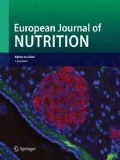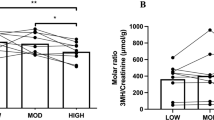Summary
Background: Athletes consume arginine and/or aspartate as potential nutritional ergogenics. Their metabolic effects are controversial and there is some evidence that ingestion of large doses of single amino acids can adversely affect the nitrogen balance or induce an amino acid imbalance. Nevertheless, the general metabolic influence of an arginine aspartate supplementation during a prolonged exercise bout has not yet been investigated.
Aim of the study: The aim of this study was, therefore, to investigate the general metabolic impact of a chronic supplementation with arginine aspartate in endurance-trained athletes at rest and during a marathon run.
Methods: Fourteen endurance-trained runners participated in this field study which was carried out according to a double-blind crossover design. 15 g of arginine aspartate or a carbohydrate-based placebo were supplemented daily for 14 days before a marathon run. Blood samples for analysis of metabolites and hormones were collected shortly before the run, after 31 km, at the end of the run, and after a recovery period of two hours. Additionally, the respiratory exchange ratio was determined during the run.
Results: The plasma level of carbohydrate (glucose, lactate, pyruvate) and fat metabolites (fatty acids, glycerol, β-hydroxybutyrate), cortisol, insulin, ammonia, lactate dehydrogenase, and creatine kinase as well as the respiratory exchange ratio were unaffected by the supplementation. In contrast, the plasma level of somatotropic hormone, glucagon, urea, and arginine were significantly increased, and the level of most of the remaining plasma amino acids as well as their sun was significantly reduced.
Conclusions: There was no obvious metabolic benefit derived from the chronic supplementation with arginine aspartate. And since furthermore the consequences of a reduction of the total plasma amino acid level are not known, the practice of using single amino acid supplements as potential ergogenics should be critically reevaluated.
Similar content being viewed by others
Author information
Authors and Affiliations
Additional information
Received: 29 December 1998, Accepted: 26 November 1999
Rights and permissions
About this article
Cite this article
Colombani, P., Bitzi, R., Frey-Rindova, P. et al. Chronic arginine aspartate supplementation in runners reduces total plasma amino acid level at rest and during a marathon run. Eur J Nutr 38, 263–270 (1999). https://doi.org/10.1007/s003940050076
Issue Date:
DOI: https://doi.org/10.1007/s003940050076




